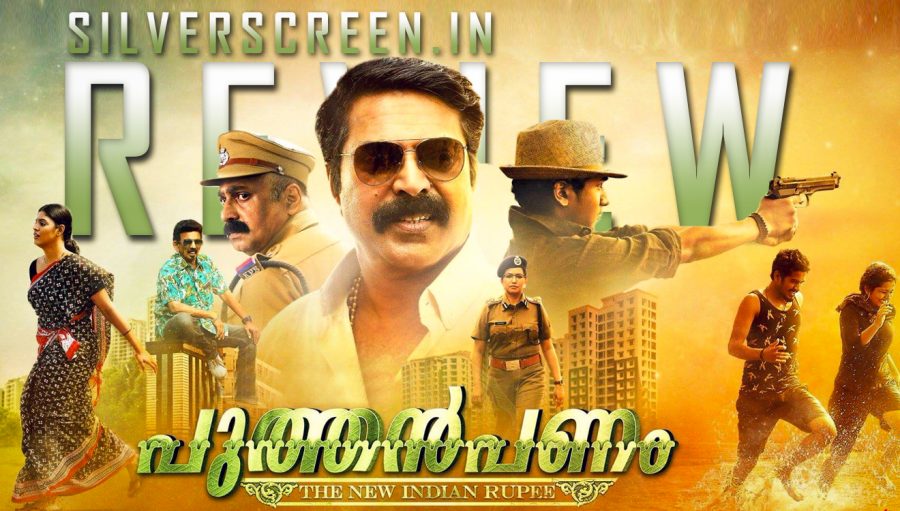Director-writer Ranjith’s Puthan Panam (The New Currency) has an impressive prelude, innate charm, a talented cast, and an accomplished star to lead the pack (Mammootty). And yet, it ends up being a forgettable film.
For one, it’s packed with too many issues (and too many actors) – from caste-based killings to custodial violence. For another, it’s sloppily edited. So much so that eventually we lose track of the meandering storyline.
***
The film opens with a young single mother and her five-year-old son stranded on a railway platform in Kerala, with no money. The sequence juxtaposes scenes from her past with her present. A past in which her husband was hacked to death by her angry, upper-caste relatives in a Tamil Nadu village. A present in which a stranger walks into her life, just like that.
The man slyly takes control of the mother-child duo by buying them food and train tickets. Later, he takes them to his one-bedroom barsati in a run-down area, like a butcher leading a pack of meek, clueless sheep to the slaughterhouse. Gulping down bottles of rum, he boasts to his friends that he isn’t afraid of the police or the law. Clearly, the woman is walking on a slippery slope.
But then, something unexpected happens. Policemen arrive, grab the man by his collar, and take him away.
He won’t see the light of day for the next eight years.
This out-of-the-blue intervention of the system into people’s life – sometimes as a saviour and sometimes as pure evil – repeats several times. And that’s precisely what makes Puthan Panam an interesting watch. There are bad men on the loose – fighting, threatening, and killing each other. But the real villain, triggering distress in everyone’s life, is the government and its arms.
***
There are personal stories, like that of the woman and her son. But Ranjith wants the audience to see the big picture, in which everyone is a puppet in the hands of the law. He uses demonetisation to prove his point, and he plays it safe by portraying its least controversial version – the one in which the only group troubled are black money hoarders; not the common man.
When the Prime Minister announces the rollback of currency notes at 8 pm on November 8, Sundari (Iniya), a domestic help, asks her teenage son Muthu (Master Swaraj) if their modest life will be affected. He says, “What is a financial reform to penniless people like us?” He is right. You see, that night Mia (Niranjana) befriends Shine (Ganapathy), a pizza delivery boy who had been nagging and stalking her for a long time, right after he helps her change a Rs 1000 note.
In Kozhikode, a wealthy businessman (Joy Mathew) is lamenting about the Rs 1000 notes he has stashed in a secret vault in his palatial house. His friend, a wealthier and more powerful tycoon, Nithyanand Shenoy (Mammootty), hurriedly leaves his Kasargod residence to meet Chandrabhanu (Sai Kumar), a high-profile politician in Kochi. The latter had handed over Rs 25 crore in cash to Shenoy’s men in a business deal, just an hour before the announcement. An angry Shenoy threatens him, asking him to return the money in new notes. However, things go terribly wrong when Chandru (Hareesh), one of Shenoy’s loyal men, accidentally shoots Chandrabhanu, killing him instantly.
This scene has an absurd quality reminiscent of films like Burn After Reading. Shenoy, while mouthing threats and making tall claims, turns his back on the camera, like the usual masala-movie hero. That’s when Chandru pulls the trigger. Shenoy’s face turns red, his aura of invincibility suddenly lost. He feels human and vulnerable. This faux-pas launches a cascade of mishaps as Shenoy and his gang try to hide the gun, which inadvertently lands in Muthu’s hands.
***
Ranjith uses hipster music (something he perhaps discovered recently) all over the film mindlessly. There is a song featuring Mia, Shine, and Muthu flaunting their newly-found power – the pistol. It starts off well, but soon becomes wearisome as Ranjith stretches it out. Same goes for the scenes depicting police violence. There is slapstick humour in how Chandru and the men are nabbed by the police. Then the film gets into Visaaranai-mode, confusing the audience. Ranjith traverses from one genre to another inconsistently, making little sense at the end.
Neither is there logic to why Shenoy, a daredevil, cools his heels instead of retrieving the pistol from the child as soon as possible and moving on to more important things. Probably because Ranjith wants to play with this unlikely pair – a tycoon and a smart teenage underdog, like he did in Pranchiyettan and The Saint.
It works to some extent, mostly due to the actors’ performance. When Shenoy tries to convince Muthu that he is in fact, a don who kills and robs, the child says, “Like a goon? Kochi is full of goons.” As if there is nothing interesting about that profession. It’s a funny scene.
***
Mammootty plays his role with the utmost sincerity, nailing the awkwardness in Shenoy’s mannerisms. There is a scene where he and his aide, Mammookkoya, are taken to Muthu’s colony by Indrans, a simpleton ragpicker. Despite being dressed in an ordinary t-shirt and lungi, Shenoy looks outstanding. His predicament – of being in a completely unfamiliar situation – is totally believable.
After a long time, Mammootty seems completely relaxed in a role.
Among the supporting actors, Baiju stands out for his flawless comic timing and nuanced performance as Kunjappan, a local thug. Indrans, who gets just a couple of scenes, is equally brilliant. Master Swaraj is a natural performer and a great dancer, and Iniya plays her part well.
***
Recommended
At the end when the film finally reaches its climax (at a snail’s pace), it’s a let down thanks to an unintentionally funny stunt sequence.
The blame lies with Ranjith, who has barely improved as a director since his initial days. He still makes films as if they were radio dramas; overtly dependent on dialogues.
Puthan Panam could have been a far better movie. It just needed some logic, and a better sense of cinema.
*****
The Puthan Panam review is a Silverscreen original article. It was not paid for or commissioned by anyone associated with the movie. Silverscreen.in and its writers do not have any commercial relationship with movies that are reviewed on the site.



